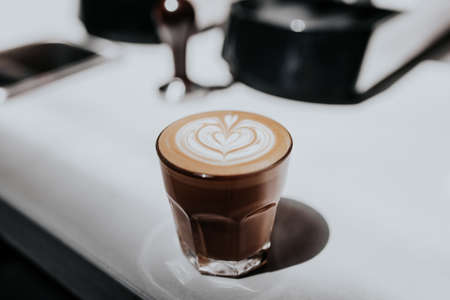Introduction: Coffee Rituals in the British Isles
In the rain-dappled streets of London, Edinburgh’s cobbled closes, or Manchester’s bustling Northern Quarter, coffee has woven itself into the fabric of daily British life. Once merely a utilitarian pick-me-up—think chipped mugs of instant granules gulped at kitchen tables or office desks—coffee in the UK has blossomed into a nuanced ritual, capturing the city’s pulse and its people’s evolving tastes. The journey from those quick fixes to today’s flourishing independent cafés and home brewing set-ups mirrors a broader cultural shift: one that prizes craftsmanship, community, and a moment of pause amid urban hustle. Now more than ever, Britons gather over flat whites in converted railway arches or linger with hand-poured brews on misty mornings, making coffee both a social anchor and an expression of personal style. This article delves into how the method of brewing—manual versus electric—not only shapes the flavour in your cup but also reflects the rhythms and rituals of UK city life.
2. Manual Brewing: Craft and Contemplation
There’s something undeniably poetic about brewing coffee by hand—a ritual that Londoners, from Hackney’s creative crowd to the city’s suburban early risers, have embraced with quiet devotion. The allure lies in the tactile engagement: the gentle bloom of freshly ground beans in a V60, the slow plunge of an AeroPress, or the familiar weight of a French press on a rainy British morning. These manual methods transform the daily caffeine fix into an act of mindfulness, where each stage is savoured as much as the final sip.
The Rituals of Manual Brewing
Unlike their electric counterparts, manual brewers demand your attention. Whether you’re swirling hot water in concentric circles over a V60 or timing your French press steep to perfection, there’s an almost meditative quality to the process. Independent cafés across Shoreditch and Soho often champion these methods not just for their artisanal cachet but for how they slow down time—inviting patrons to pause and appreciate both craft and company.
Popular Manual Brewing Methods in the UK
| Method | Distinctive Features | Cultural Presence |
|---|---|---|
| AeroPress | Smooth body, clarity; portable and playful experimentation | Favoured by baristas at indie coffee shops; beloved by home brewers for its versatility |
| V60 Pour-Over | Bright, clean cup; accentuates subtle flavour notes | A staple at specialty cafés; seen on kitchen counters across London flats |
| French Press (Cafetière) | Richness and depth; comforting familiarity | A British brunch classic; evokes nostalgia and communal warmth |
The Pleasure in Every Detail
The beauty of manual brewing lies not only in taste but also in nuance—the aroma released when grinding beans, the anticipation between pours, and even the gentle clink of ceramic against wood. In a city as fast-paced as London, these moments are precious. Each hand-crafted cup becomes more than just a beverage—it’s a celebration of patience, tradition, and the small joys woven through daily life.

3. Electric Machines: Efficiency in a Fast-Paced City
In the relentless tempo of British urban life, electric coffee machines and pod systems have become indispensable fixtures, humming quietly in kitchens, offices, and bustling high-street cafés. These gleaming gadgets are the unsung heroes of the morning rush, offering a level of efficiency that speaks to the city dweller’s need for both speed and reliability. With just a press of a button, the familiar whirring sound promises a cup brewed with unwavering consistency—no need to measure, grind, or even wait for water to boil.
The Urban Pulse and Coffee on Demand
For many Londoners or Mancunians darting between tube stations and morning meetings, convenience is king. The presence of electric machines in office break rooms is as much a part of modern British work culture as the obligatory “fancy a cuppa?” whispered over cubicle partitions. High-street chains like Costa or Pret have embraced these innovations, ensuring queues move briskly and every cup tastes reassuringly familiar.
A Domestic Revolution
At home too, these machines have found their place among sleek kitchen counters. Whether it’s a Nespresso nestled beside the toaster or a bean-to-cup marvel standing sentinel by the window, they allow even those pressed for time to indulge in a decent brew before dashing out into the drizzle. The predictability of flavour removes guesswork—a comfort for those who prize routine over ritual.
The Double-Edged Sword of Consistency
Yet, while electric brewing fits seamlessly into Britain’s modern rhythm, some would argue it comes at the expense of individuality and craft. Still, for countless city dwellers juggling deadlines and dreams under grey skies, this trade-off feels more than fair. After all, when life moves quickly, there’s something quietly satisfying about knowing your coffee will never let you down.
4. Cultural Nuances: The Unspoken Language of Coffee Preparation
If you linger in any British city, from the cobbled closes of Edinburgh to the creative lanes of Bristol, you’ll notice that how a cup of coffee is brewed is not merely a matter of taste—it’s a quiet reflection of British sensibilities and local lore. Manual brewing often whispers of patience, the gentle ritual mirroring a value deeply woven into the national psyche: good things, as they say, come to those who wait. Electric methods, meanwhile, tip their hat to pragmatism, getting on with it in true British fashion—efficient, practical, yet never entirely sacrificing the pleasure of the process.
But beyond these broad strokes, each region brews with its own flavour. In Edinburgh, you might find the pour-over accompanied by a soft-spoken chat about “the weather turning,” or a barista asking if you’d like your coffee “wee” (small). Meanwhile, down in Bristol, order a flat white and you’ll likely be greeted with easy banter and perhaps a cheeky “alright me babber?”—a colloquial nod to local warmth.
These choices reveal more than caffeine preferences; they are social signposts. Manual brewing can become an almost ceremonial act—a reason to pause and connect, to chat about nothing in particular while waiting for the perfect extraction. Electric brewers fit seamlessly into busy mornings: quick chats over kitchen counters before dashing out into drizzly streets.
| Region | Brewing Preference | Common Slang/Colloquialisms | Coffee Rituals |
|---|---|---|---|
| Edinburgh | Manual Pour-Over & French Press | “Wee cuppa”, “Braw brew” | Slow mornings; sharing stories over steaming mugs |
| Bristol | Electric Drip & Flat White Machines | “Me babber”, “Cheers drive” | Lively café culture; quick catch-ups with mates |
| London | Moka Pot & Espresso Machines | “Fancy a brew?”, “Proper coffee” | Espresso shots on-the-go; people-watching at bustling kiosks |
The unspoken language of coffee preparation is stitched into everyday life. Whether it’s waiting patiently for grounds to bloom or firing up an electric brewer with one hand while checking the Tube schedule with the other, every choice is tinged with local character. And through it all flows conversation—sometimes reserved, sometimes raucous, always uniquely British—binding friends and strangers alike in the aromatic embrace of a well-made cup.
5. Environmental and Social Impact: A Moment of Reflection
If you pause for a moment, coffee in hand, there’s a quiet revolution brewing beneath the surface of every cup poured in British homes and high streets. The sustainability conversation—once a footnote in coffee culture—now sits front and centre, prompting us to weigh the environmental footprint of manual versus electric brewing methods. Manual brewing, with its slow pace and tactile rituals, often appeals to those seeking to reduce energy consumption. There’s something profoundly satisfying about knowing your morning cafetière or pour-over has left a lighter mark on the planet compared to the hum of an electric machine.
The eco-conscious dialogue doesn’t stop at how we brew; it extends to what we brew. Across the UK, ethically sourced and eco-friendly beans are more than a trend—they’re a testament to a nation reimagining its relationship with daily rituals. Roasteries from Bristol to Edinburgh now champion direct trade, championing transparency and fair pay for producers. This shift is mirrored in the popularity of ‘keep cups’—a staple among city commuters and university students alike. Swapping disposable cups for sturdy, reusable vessels is now as much a statement of intent as it is an act of sustainability.
Local roasteries have become hubs not just for great brews but for community spirit. Supporting British producers and small businesses feeds back into local economies, weaving coffee culture tightly with notions of place and purpose. It’s about celebrating traceability—from the rolling hills where beans are grown to the hands that roast them in our neighbourhoods. In this delicate balance between indulgence and responsibility, each cup becomes an opportunity: to savour every drop and every choice along the way.
6. Conclusion: Finding Meaning in Every Cup
In our bustling British lives, where the pace can often feel relentless, coffee quietly remains a thread that ties together our moments of pause. Whether you’re drawn to the gentle ritual of a manual pour-over—carefully swirling the kettle and watching each drip—or you rely on the familiar hum and efficiency of an electric brewer, each cup offers more than just caffeine. It’s an invitation to slow down, to reclaim a few sacred minutes from the whirr of daily commitments. In these small acts, we rediscover the art of living deliberately—a concept woven through British culture from cosy high street cafés to the comfort of our own kitchens. So next time you brew, take a moment for yourself. Let your coffee be a gentle reminder: even amidst city hustle or rainy afternoons, there’s meaning in every drop, and sometimes, the most ordinary rituals become extraordinary when savoured with intention.


